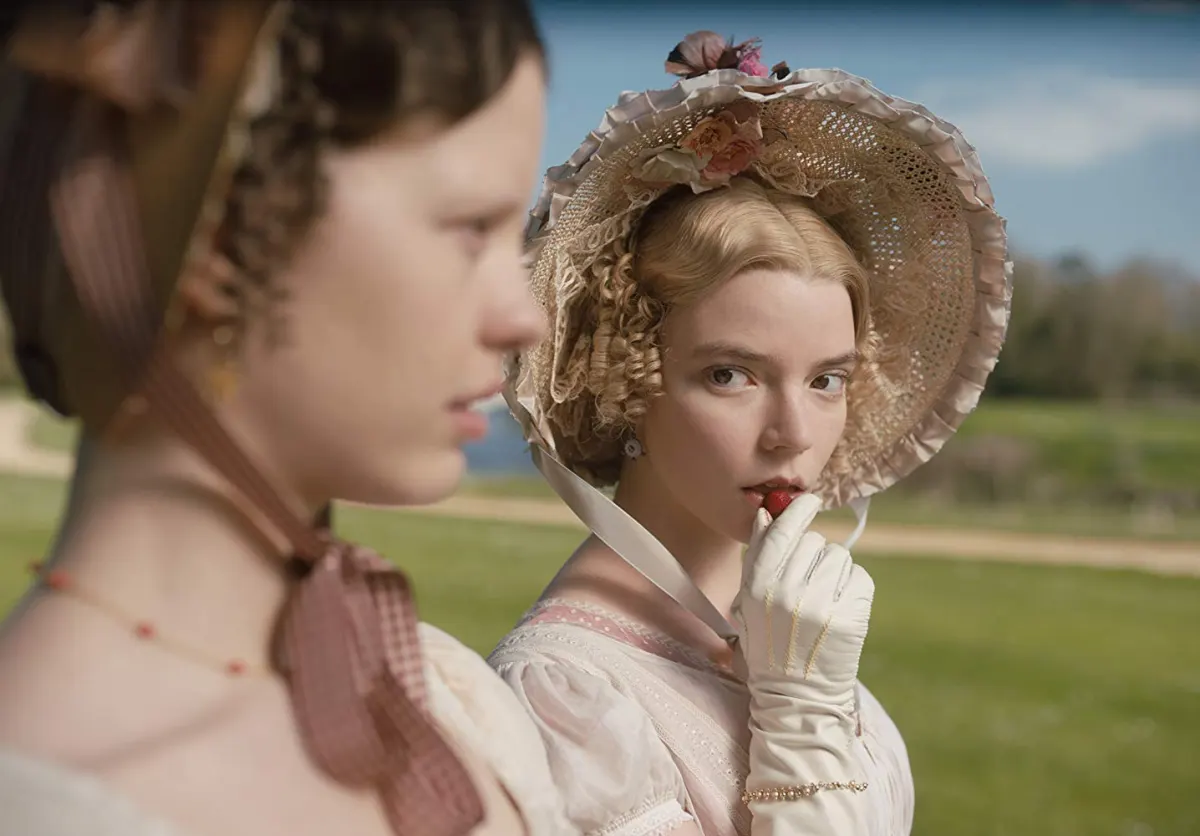“Emma Woodhouse, handsome, clever, and rich, with a comfortable home and a happy disposition… and had lived nearly twenty-one years in the world with very little to distress or vex her.”
Elizabeth Bennett may be the most popular, and the Dashwood sisters the most well rounded, but Emma Woodhouse is probably the most dynamic of Jane Austen’s heroines. Such a cool girl, she’s the only one whose name made it to the title.
Autumn de Wilde’s Emma is a very faithful adaptation of the original novel. Emma, played with crispy witticism by Anya Taylor-Joy, is brought to life in all her well-meaning snobbery. Unlike a lot of Jane Austen’s other heroines, Emma has pretty much everything: beauty, wit, wealth, and a great amount of independence. Even her father’s hypochondriac behavior (Bill Nighy) doesn’t actually deter her from fun. Emma’s trouble in life is her own hubris and lack of maturity.
After the marriage of her governess and mother figure, Miss Taylor—now Mrs. Weston, played by Gemma Whelan—Emma gets it in her head to be a matchmaker and takes on Harriet Smith (Mia Goth) as her new friend and project. Despite the warnings of her family friend and verbal sparring partner George Knightley (Johnny Flynn), Emma is determined to do as she wishes, because how could a girl so clever be wrong?
Emma has been adapted numerous times, most famously in the 1995 teen-modernized drama Clueless, but also famously in the four-part BBC miniseries, starring Romola Garai as Emma in 2009, and the 1996 American comedy starring Gwyneth Paltrow as Emma. When I walked out of Emma, despite knowing I enjoyed it, there was something that kept me from fully loving it the way I wanted. Sometimes, the downside of having so many versions of a story to choose from is how certain stories have updated the text in a way that highlights flaws in others.
Taylor-Joy, while very good at the comedic tone, is sometimes a little too mean for the charming aspects of Emma to come through. One of the things about Romola Garai’s version that I love is you can see the childlike hubris of Emma up against the kind-hearted parts of her nature. However, I do think it was a riskier move to make Emma’s snobbery front and center, because the interesting thing about that character is how she is forced to grow and evolve in her thinking.
Flynn’s Mr. Knightley is certainly one of the highlights, and I feel he might be the person that allows people to see Mr. Knightley as an equal to Pride and Prejudice’s Mr. Darcy. In fact, I feel when he and Taylor-Joy are onscreen together, both of them give amazing performances. There is plenty of chemistry between them, and their dance scene has all the sexual tension you love to see in a period drama where the most overt sexual thing that happens is an intense hand squeeze. This version of Emma is deliciously sensual, and I do feel like de Wilde’s directing is rich and takes full advantage of all the set design.
Much like Little Women, and honestly strikingly more so, is how painfully white this adaptation of Emma is, especially considering PBS’s Sanditon adaptation, which has one of Jane Austen’s only characters of color, Georgiana Lambe, a wealthy heiress, and highlights that Austen did know there was a place for Black characters in her works. Unlike Little Women, which has a small cast of characters and most of them related, characters like Harriet Smith, Mr. Elton, and Mrs. Elton have so much room to be non-white (especially Harriet) that it is just jarring that they aren’t. It doesn’t help that they kept in the g*psy line and said the word several times.
Overall, I think that if you have not seen any previous adaptations of Emma, this is a solid one that is well shot and has talented actors from across all your favorite British television dramas. However, if you are overly familiar with the story and its adaptations, you might be a little bit pickier about how the characters interact.
Also, if you haven’t read the book, highly recommend the annotated version.
(image: Focus Features)
Want more stories like this? Become a subscriber and support the site!
—The Mary Sue has a strict comment policy that forbids, but is not limited to, personal insults toward anyone, hate speech, and trolling.—










Published: Feb 4, 2020 11:58 am